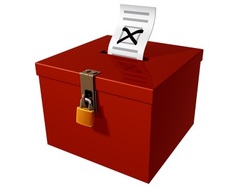The moderate center, the foundation of
our political system, is not holding
Ex-Defense Secretary Robert Gates
We have lost the ability to execute even basic functions of government
In a speech at CSIS, ex-Defense Secretary Robert Gates talked about excessive partisanship:
“Though American politics has always been a shrill and ugly business going back to the Founding Fathers, as a result of several polarizing trends we have now lost the ability to execute even the most basic functions of government, much less solve the most difficult and divisive problems facing this country.” He argues there are a variety of reasons, some structural, some historical and some outside the control of government. “As a result of these and other polarizing factors, the moderate center, the foundation of our political system, is not holding. Moderation is now equated with lacking principles. Compromise means selling out. So just at a time when this country needs bipartisan strategies that can and must be sustained through more than one presidency and more than one Congress to deal with our most serious long-term problems, most of the trends are pointing in the opposite direction." |
"Critical ideas and progress in our history often have come from thinkers and ideologues on both the left and the right. But the laws and policies that ultimately implemented the best of those ideas have come from the vital political center, usually as a result of compromise.” |

“What I like to call the sensible center has now virtually disappeared in Washington.”
– ex-Sen. Olympia Snowe, R-Maine 
"It does worry me if you allow voices on the ends of the political extreme to dominate the debate.”
-- ex-Sen. Mark Warner, D-Virginia Source: CNN The Christian Science Monitor reports: “Too many competent legislators have retired from Congress for the same reason as Senator Snowe. They’re sick and tired of being trapped in a rotten system,” said Mark McKinnon, a cofounder of No Labels, a public-interest group promoting bipartisan solutions, in a statement.
Other centrists who chose to step out include Sen. Ben Nelson, D-Nebraska; Sen. Jim Webb, D-Virginia; Sen. Kent Conrad, D-North Dakota; Sen. Jeff Bingaman, D-New Mexico; Sen. Lamar Alexander, R-Tenn. and Sen. Evan Bayh, D-Indiana |
"Our politics have become hijacked by hyper partisans"
John Avlon, a CNN contributor and senior political columnist for Newsweek and The Daily Beast, writes “Our politics have become hijacked by hyper-partisans. Our divided Congress is dysfunctional. Our government is broken.
Conservatives have long gloried in the sport of RINO-hunting, trying to defeat what they call "Republicans In Name Only" in closed partisan primaries. Now liberal Democrats are trying to get into the game. These professional partisans believe the cure for what ails our political system is further polarization. They are peddling a view of politics as an all or nothing ideological war, the strategy: mutually assured destruction.” |
Filibuster & gerrymandering increase polarization
|
Matt Miller of the Washington Post writes we need to restore majority rule in America by scraping the filibuster. Otherwise, nothing can get done.
“It’s no exaggeration to say you can’t get anything done in the Senate nowadays without 60 votes…And today, the minority can bottle things up quietly without explaining themselves in public. The result is the tyranny of the minority that the founders warned against. Alexander Hamilton, in Federalist No. 75, noted that “every political establishment in which this [supermajority] principal has prevailed, is a history of impotence, perplexity and disorder.” James Madison wrote in Federalist No. 58 that with a supermajority requirement, the “fundamental principle of free government would be reversed.” |
As the chart above from The Wall Street Journal shows, the percentage of politicians that are voting the party line have been increasing for the past four decades both in the Senate and the House. Independent thinking has become irrelevant and crossing the aisle too treacherous. Although gerrymandering may be a factor in the House, it doesn’t apply to the Senate. Similarly, the filibuster is a factor in the Senate but not in the House. As such, there must be other factors at play that are contributing to the increase in polarization. |
Constituency doesn't seem to impact how politicians vote
Washington Post: [Top graph] “The vertical axis is a measure of candidate ideology based on roll call voting. Higher numbers indicate more conservative views, and lower numbers indicate more liberal views. The horizontal axis captures how well Obama did in that district in 2008. The red dots are Republican House members and the blue dots are Democrats. All of the red dots are higher than all of the blue dots. Polarization in the 113th Congress is already evident.
The important thing in this graph is the black lines that capture the relationship between, essentially, how liberal or conservative the member’s constituents are and how liberal or conservative the member is. Those lines should slope downward: the more liberal the district, the more liberal the member. But the lines are mostly flat, with only a slight downward slope among Republicans. No matter whether Obama won 20 percent or 50 percent of their district, Republican representatives have voted similarly — that is, they have taken conservative positions on average. No matter whether Obama won 50 percent or 80 percent of their district, Democratic representatives have taken liberal positions, on average. Constituency hasn’t affected anyone’s overall voting behavior that much. And the 113th Congress is no exception. Here, via political scientist Nolan McCarty, is a picture of ideology in the 108th House compared to the 2004 vote for George W. Bush in their district [bottom graph]. [As to the reasoning behind the polarization] “Another possibility has to do with who controls local and state party organizations, who play a large role in selecting new candidates to run for office. In research on one of the most polarized state legislatures, California’s, Seth Masket finds that local party organizations have been captured by activists for whom ideological fealty is paramount.” |
Two factors in particular are undermining the political center
Perverse incentives in primary elections
“Because activists who demand loyalty and see compromising as selling out dominate party primaries and conventions, candidates who seek their permission to be on the November ballot find themselves under great pressure to take hard-line positions. This tendency toward rigidity—and the party system that enables it—is at the root of today’s political dysfunction.” Mr. Mickey Edwards the author of, The Parties Versus the People. More.
|
Perverse incentives in media
In a speech at CSIS, ex-Defense Secretary Robert Gates stated: “24/7 digital media environment that provides a forum and wide dissemination for the most extreme and vitriolic opinions, leading, I believe, to a coarsening and dumbing-down of the national political dialogue.” More.
|








